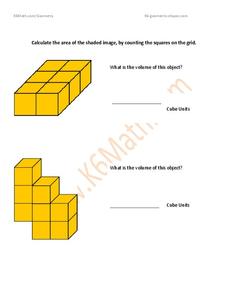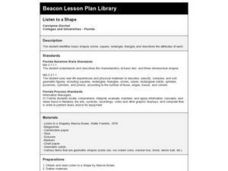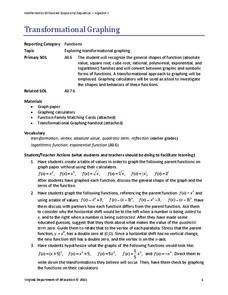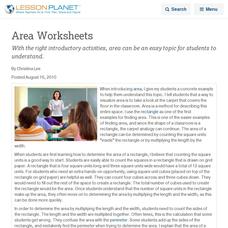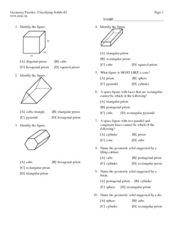Curated OER
Calculate Area Using Shaded Grids
In this area worksheet, students calculate area of shapes using shaded grids, writing answers in cube units. A reference web site is given for additional activities.
Curated OER
Listen to a Shape
First graders identify basic shapes (circle, square, rectangle, triangle) and describes the attributes of each. They use magazines to find examples of each shape, and then make a collage.
Curated OER
Construct Figures to Find Specific Volume
Sixth graders use number cubes to explore volume of two-dimensional shapes. They roll a die and construct a shape using the numbers rolled as measurements of the sides. They estimate the volume of a given object, and then use the...
Curated OER
Fourths of Sets
Students create a set of cards that represent factors of four and use these cards to play a game in which they practice separating numbers into fourths. They first practice separating numbers into fourths with a projected computer...
Curated OER
Discovering Solids
Second graders engage in a lesson that is about the discovery of solids. They identify using shapes like cones, spheres, cylinders, and cubes in various different situations. Students explore the classroom in order to find examples of...
Charleston School District
Solving for a Missing Dimension
If a can has a volume of twelve ounces, how tall it should be? If you can work with volume formulas, it's is an easy measurement to find. After finding the volume of figures in the previous lesson of the series, learners now...
Curated OER
Amazing Triangles
Student scientists investigate triangle structures. In this building lesson plan, students explore how to design triangle braces in the construction of structures in order to build a stronger base.
EngageNY
Analyzing a Graph
Collaborative groups utilize their knowledge of parent functions and transformations to determine the equations associated with graphs. The graph is then related to the scenario it represents.
EngageNY
Exponents
Powered up! Here's a great resource on exponents. Scholars build on their previous understanding of exponents to include all positive real number bases. Distinguishing between an and a^n is a major goal in the fifth instructional...
Pyro Innovations
Get into Shape
Shapes are so fun! Little ones explore, identify, and create shapes using tangrams or pattern blocks. The activity is intended to stimulate critical thinking while engaging learners through play and shape identification. Each child will...
02 x 02 Worksheets
Inverse Functions
Young mathematicians look for patterns in inverse functions as they relate to the original functions. The comprehensive lesson emphasizes vocabulary throughout as well as algebraic and graphical characteristics of the inverse functions.
Curated OER
Picasso Portraits
Explore Pablo Picasso. For this art history and face drawing lesson plan, read a brief biography of Pablo Picasso. Draw a self portrait following guided instruction by the teacher. Paint a self-portrait and practice adding white...
West Contra Costa Unified School District
Solving Radical Equations
How can you make solving radical equations more engaging? Provide your math class with a hands-on activity that focuses on solving radical equations with flash cards. A warm-up and exit ticket flank direct instruction of the steps...
Radford University
A Change in the Weather
Explore the power of mathematics through this two-week statistics unit. Pupils learn about several climate-related issues and complete surveys that communicate their perceptions. They graph both univariate and bivariate data and use...
Virginia Department of Education
Transformational Graphing
Find relationships between the structure of a function and its graph. An engaging lesson explores seven parent functions and their graphs. Learners match functions to their graphs and describe transformations.
Curated OER
Prime Factorizations - Post Test
In this prime factorizations worksheet, students complete a set of 10 multiple choice questions. Students may print out the test or click on a link to see answers.
Curated OER
Area Worksheets
With the right introductory activities, area can be an easy topic for students to understand.
Curated OER
Similarity of Length, Area, and Volume
In this similarity worksheet, students determine the length, area and volume of similar figures. This three-page worksheet contains explanations, examples, and 20 problems. Answers are provided on page three.
Exploratorium
Building Three-Dimensional Structures
Are you looking for a good 3-D geometry lesson that includes hands-on activities for your middle schoolers? Look no further than this one! Pupils use centimeter grid paper embedded in the plan, along with detailed construction...
Curated OER
Marshmallow Geometry
In this three-dimensional shapes geometry lesson, learners identify geometric solids and name their properties. They define "face," "edge," and "vertex," and construct geometric solids using marshmallows as vertices and toothpicks as edges.
Curated OER
Geometry Practice: Classifying Solids #2
In this solids worksheet, students identify the characteristics of solids. They name solids and determine the number of faces. This three-page worksheet contains seventeen problems. Answers are listed on the last page.
Del Mar College
Exponential and Radical Rules
So many rules and so little time. Make it easy and provide all the exponent and radical rules in one place as an easy reference guide. All of the properties come with several examples to show how the rules apply to different problems.
California Academy of Science
Global Climate Change and Sea Level Rise
Ice is nice, and its condition on the planet has a significant effect. Junior geoscientists experiment with ice melting in both water and on land to discover how each affect the rising sea level. This detailed lesson outline even...
Curated OER
Worksheet 19: Ship Positions
In this math worksheet, students read informational paragraphs and then answer 18 questions using data from their readings. Questions are about vectors, positions, distance and orbits.


